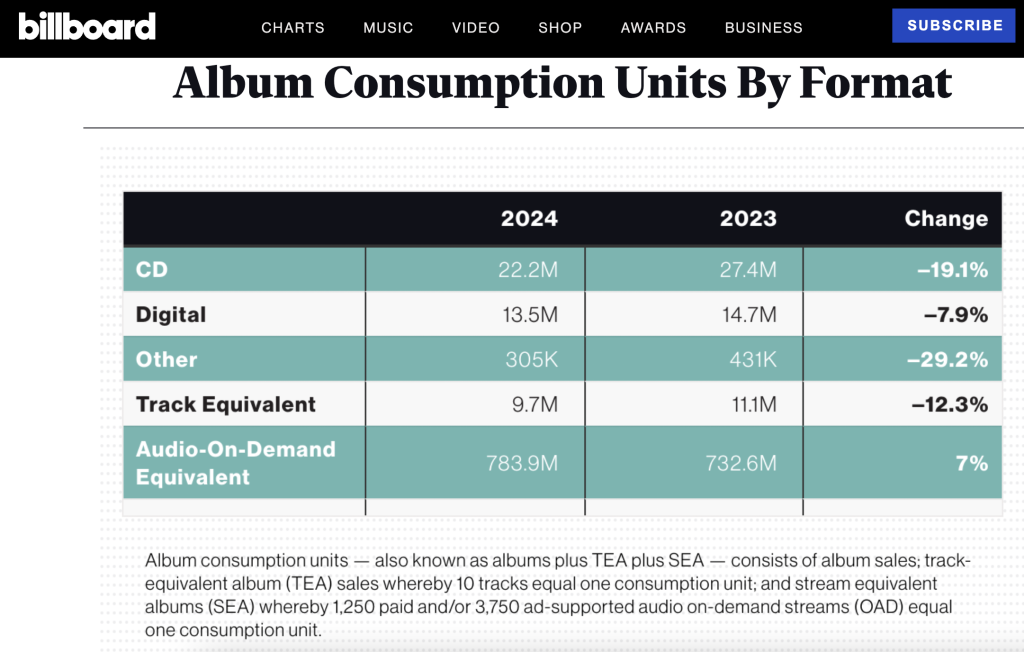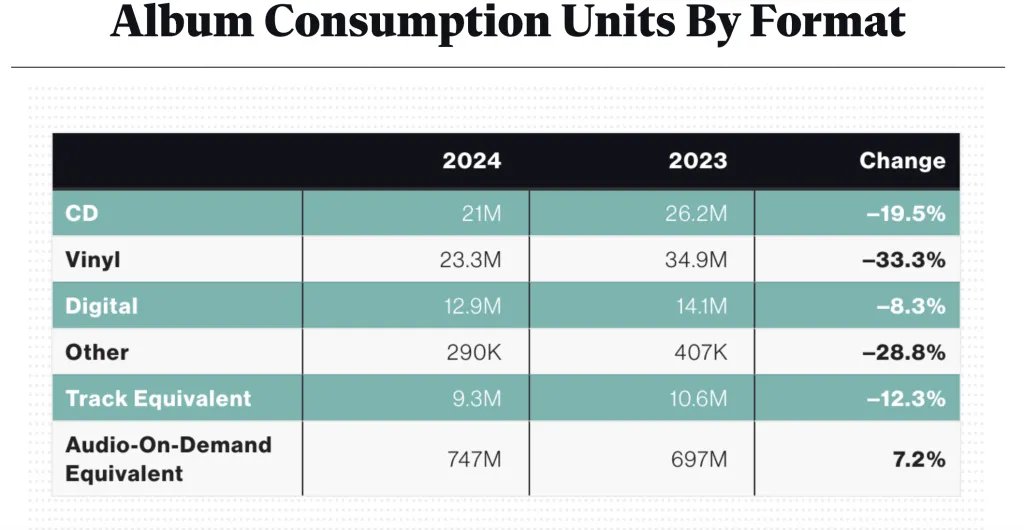
Where’s Vinyl? Billboard Removes the Format From Its Site (Photo Credit: DMN Screengrab)
What are vinyl record sales like in the US? Don’t ask Billboard, which has now scrubbed its site of vinyl sales figures after reporting an extreme 33.3% year-over-year sales decline.
That shocking decline raised serious questions about the ‘vinyl comeback’ and resulted in an investigatory report by DMN Pro. Unfortunately, the takeaways from that report were hardly upbeat, with Luminate, Billboard, the Vinyl Alliance, and other organizations differing wildly over how many vinyl records are selling in 2024.
Has the Vinyl Comeback Been Greatly Exaggerated? A Closer Look at Some Confusing New Data
After DMN reported the 33.3% decline that appeared on Billboard’s site, angry emails and demands for corrections came next. The Vinyl Alliance called for an immediate correction, while Luminate blasted Billboard’s tallies — which are ironically based on Luminate data — as ‘inaccurate’ and ‘unauthorized.’
If that isn’t confusing enough, read on.
Strangely, despite the demands by Luminate for corrections on Digital Music News, Billboard wasn’t updating their figures. A few days after DMN’s first report on the extreme decline, Billboard’s ‘Market Watch’ tally of format sales transitioned to a 32.6% year-over-year decline with a new disclaimer. Now, the vinyl sales figures have been removed entirely.
Exactly why Billboard has scrubbed its site of vinyl sales remains unclear, and owner Penske Media Corporation (PMC) declined to issue a statement on the matter.
Lying at the heart of this mess is a significant transition in how Luminate counts vinyl sales. Leading into 2024, Luminate’s updated methodology prompted howls of protests from independent record stores and vinyl groups. The result: indie retailers, led by the Vinyl Record Manufacturing Association (VRMA), branched off and launched their own vinyl chart, with Luminate sticking to their drastically reduced year-over-year figures.
Luminate told DMN that year-over-year comparisons were impossible given the methodological changes created at the beginning of 2024. These are two different counting methods, according to Luminate, though the revised methodology clearly resulted in dramatically lower figures.

Billboard’s ‘Market Watch’ page for ‘Album Consumption Units by Format’ on October 15th, 2024.
But year-over-year comparisons aside, why are the 2024 figures so much lower? Regarding the drastic change, Billboard issued this disclaimer on its site:
“NOTE: As previously reported, Luminate changed the methodology behind its independent retail sales reporting beginning Week 1 of 2024. While the new modeled methodology more accurately represents the independent retail market, there is not available comparable historical data to provide an accurate year-over-year trend regarding physical sales, including vinyl, and therefore any YoY changes reflected here are not a clean comparison and should not be taken as such.”
It should be noted that sales figures from the RIAA, BPI, and IFPI all show continued year-over-year gains in 2024 vinyl shipments.
Those are documented in detail in DMN Pro’s investigatory report on the matter. Indeed, 2024 has witnessed a crush of vinyl releases from Taylor Swift, all variations of The Tortured Poets Department. That seemed like a dousing of lighter fluid on the vinyl bonfire, though it’s unclear how those releases registered on Luminate’s redialed radar.
So what happens next?
At one point, Luminate reversed course and stated that vinyl sales were actually up 6% on the year. A few days later, however, it slipped that this sudden increase was only generated after indie record store tallies were completely removed from the mix. And Billboard never changed its figures to reflect the increase (even though Luminate demanded that DMN change theirs).
Enter Penske Media Corporation, which counts both Billboard and Luminate as properties. It now appears that Billboard and its sibling Luminate are huddling on the next steps, perhaps figuring out which revised dataset to present to the world.
Will a dramatic ‘reversal of a reversal’ result?
Billboard now has a choice: switch to Luminate’s revised single-digit year-over-year gains, or stay consistent with its monstrous year-over-year declines. Or, something in-between.
Either way, more vinyl-counting fireworks are almost certainly ahead. Stay tuned.


Red flags should have gone up long ago, as well, concerning news media consolidation in the music sector. One company owning a vast amount of the organs of “journalism” covering a particular market sector of the American economy is “troubling” at best, an issue that has been the subject of public discussion with the US Government in the past. Whether or not that issue has bearing on the current questions concerning reporting on vinyl sales is not at all clear, but it does raise interesting First Amendment and antitrust issues that deserve greater attention. In light of the Washington Post and LA Times debacles currently unfolding regarding political endorsements and corporate influence in media, shining a stronger light on consolidated ownership of news sources should be more of a priority than it is. Or maybe everyone should just watch Citizen Kane, Mr. Smith Goes to Washington, and Meet John Doe.